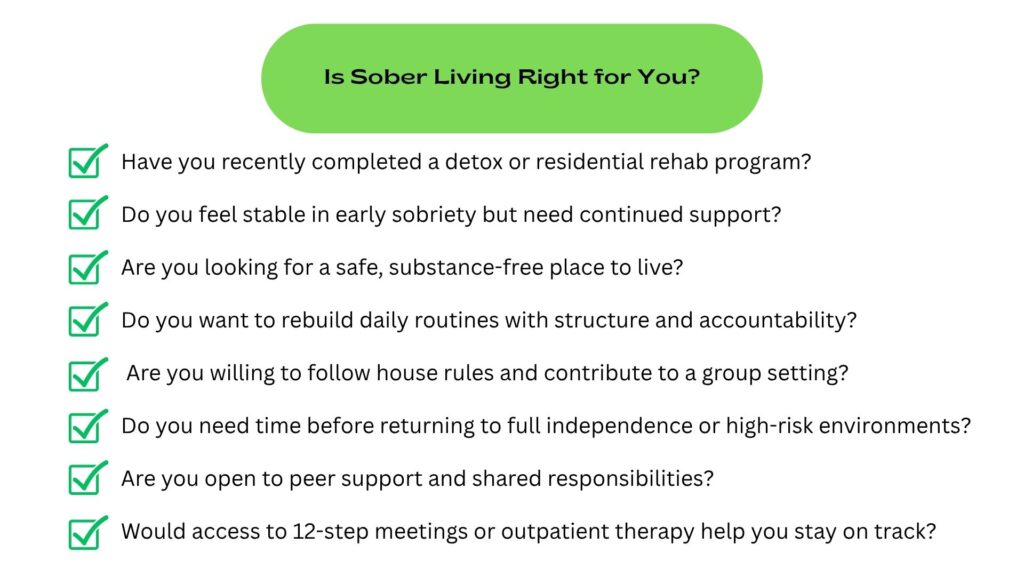Leaving͏͏ rehab͏͏ is͏͏ a͏͏ big͏͏ milestone,͏͏ but͏͏ staying͏͏ sober͏͏ afterward͏͏ can͏͏ be͏͏ tough.͏͏
Many͏͏ people͏͏ need͏͏ continued͏͏ support—and͏͏ that’s͏͏ where͏͏ sober͏͏ living͏͏ comes͏͏ in.͏͏
It͏͏ provides͏͏ a͏͏ structured,͏͏ safe͏͏ space͏͏ to͏͏ maintain͏͏ sobriety͏͏ and͏͏ rebuild͏͏ daily͏͏ routines.
A͏͏ sober͏͏ living͏͏ environment͏͏ offers͏͏ safety,͏͏ structure,͏͏ and͏͏ community—a͏͏ place͏͏ where͏͏ you͏͏ can͏͏ continue͏͏ the͏͏ recovery͏͏ process͏͏ without͏͏ the͏͏ pressure͏͏ of͏͏ doing͏͏ it͏͏ alone.͏͏
Whether͏͏ you’re͏͏ recovering͏͏ from͏͏ alcohol͏͏ addiction,͏͏ drug͏͏ use,͏͏ or͏͏ both,͏͏ this͏͏ kind͏͏ of͏͏ transitional͏͏ housing͏͏ provides͏͏ an͏͏ important͏͏ bridge͏͏ between͏͏ treatment͏͏ and͏͏ long-term͏͏ independence.
What͏͏ Is͏͏ Sober͏͏ Living?
Sober͏͏ living͏͏ refers͏͏ to͏͏ a͏͏ type͏͏ of͏͏ transitional͏͏ housing͏͏ designed͏͏ for͏͏ individuals͏͏ recovering͏͏ from͏͏ substance͏͏ use͏͏ disorder.͏͏
It͏͏ provides͏͏ a͏͏ structured,͏͏ alcohol͏͏ and͏͏ drug͏͏ free͏͏ environment͏͏ that͏͏ supports͏͏ residents͏͏ as͏͏ they͏͏ build͏͏ healthy͏͏ routines,͏͏ maintain͏͏ sobriety,͏͏ and͏͏ prepare͏͏ to͏͏ live͏͏ independently.͏͏
These͏͏ homes͏͏ serve͏͏ as͏͏ a͏͏ crucial͏͏ bridge͏͏ between͏͏ inpatient͏͏ treatment͏͏ and͏͏ fully͏͏ independent͏͏ living,͏͏ offering͏͏ a͏͏ softer͏͏ transition͏͏ than͏͏ medical͏͏ rehab͏͏ or͏͏ hospitals,͏͏ which͏͏ provide͏͏ round-the-clock͏͏ clinical͏͏ care.
A͏͏ sober͏͏ living͏͏ facility͏͏ is͏͏ different͏͏ from͏͏ halfway͏͏ houses͏͏ or͏͏ other͏͏ recovery͏͏ residences͏͏ in͏͏ that͏͏ it͏͏ focuses͏͏ heavily͏͏ on͏͏ peer͏͏ support͏͏ and͏͏ accountability͏͏ without͏͏ direct͏͏ clinical͏͏ supervision.͏͏
The͏͏ emphasis͏͏ is͏͏ on͏͏ creating͏͏ a͏͏ safe,͏͏ stable͏͏ sober͏͏ living͏͏ environment͏͏ where͏͏ individuals͏͏ can͏͏ practice͏͏ skills͏͏ needed͏͏ for͏͏ long-term͏͏ recovery͏͏ while͏͏ surrounded͏͏ by͏͏ a͏͏ sober͏͏ community͏͏ committed͏͏ to͏͏ similar͏͏ goals.
Typical͏͏ expectations͏͏ in͏͏ a͏͏ sober͏͏ living͏͏ house͏͏ include:
- No͏͏ drug͏͏ or͏͏ alcohol͏͏ use͏͏ allowed
- Curfews͏͏ to͏͏ maintain͏͏ routine
- Participation͏͏ in͏͏ house͏͏ chores͏͏ and͏͏ shared͏͏ responsibilities
- Attendance͏͏ at͏͏ support͏͏ meetings͏͏ such͏͏ as͏͏ a͏͏ 12-step͏͏ program͏͏ or͏͏ Alcoholics͏͏ Anonymous͏͏ (AA)
- Regular͏͏ drug͏͏ and͏͏ alcohol͏͏ testing͏͏ for͏͏ accountability
Residents͏͏ benefit͏͏ from͏͏ a͏͏ strong͏͏ support͏͏ system͏͏ that͏͏ includes͏͏ peer͏͏ encouragement͏͏ and͏͏ guidance͏͏ from͏͏ a͏͏ house͏͏ manager,͏͏ who͏͏ helps͏͏ enforce͏͏ rules͏͏ and͏͏ create͏͏ a͏͏ trauma-informed,͏͏ trusting͏͏ environment.͏͏
This͏͏ balance͏͏ of͏͏ structure͏͏ and͏͏ community͏͏ support͏͏ is͏͏ key͏͏ to͏͏ reducing͏͏ relapse͏͏ risk͏͏ during͏͏ the͏͏ vulnerable͏͏ post-treatment͏͏ phase.
Sober͏͏ living͏͏ homes͏͏ offer͏͏ a͏͏ vital,͏͏ supportive͏͏ step͏͏ in͏͏ the͏͏ recovery͏͏ process,͏͏ helping͏͏ people͏͏ recover͏͏ from͏͏ substance͏͏ use͏͏ while͏͏ rebuilding͏͏ independence͏͏ within͏͏ a͏͏ caring͏͏ and͏͏ structured͏͏ setting.
Why͏͏ Sober͏͏ Living͏͏ Matters
The͏͏ period͏͏ after͏͏ inpatient͏͏ treatment͏͏ is͏͏ one͏͏ of͏͏ both͏͏ hope͏͏ and͏͏ vulnerability.͏͏
Many͏͏ individuals͏͏ face͏͏ emotional͏͏ and͏͏ psychological͏͏ challenges͏͏ as͏͏ they͏͏ transition͏͏ back͏͏ into͏͏ everyday͏͏ life,͏͏ where͏͏ triggers͏͏ and͏͏ stressors͏͏ can͏͏ increase͏͏ the͏͏ risk͏͏ of͏͏ relapse.͏͏
This͏͏ gap͏͏ between͏͏ the͏͏ structured͏͏ care͏͏ of͏͏ inpatient͏͏ treatment͏͏ and͏͏ independent͏͏ living͏͏ is͏͏ a͏͏ critical͏͏ time͏͏ when͏͏ support͏͏ is͏͏ most͏͏ needed.
Sober͏͏ living͏͏ homes͏͏ provide͏͏ a͏͏ trauma-informed,͏͏ alcohol͏͏ and͏͏ drug͏͏ free͏͏ environment͏͏ designed͏͏ to͏͏ create͏͏ safety͏͏ and͏͏ trust.͏͏
These͏͏ settings͏͏ offer͏͏ more͏͏ than͏͏ just͏͏ a͏͏ place͏͏ to͏͏ stay—they͏͏ foster͏͏ a͏͏ community͏͏ where͏͏ residents͏͏ find͏͏ peer͏͏ connection͏͏ and͏͏ essential͏͏ sobriety͏͏ support.͏͏
This͏͏ shared͏͏ commitment͏͏ to͏͏ recovery͏͏ helps͏͏ individuals͏͏ feel͏͏ understood͏͏ and͏͏ less͏͏ isolated͏͏ during͏͏ a͏͏ difficult͏͏ phase͏͏ of͏͏ their͏͏ journey.
A͏͏ 2024͏͏ study͏͏ published͏͏ in͏͏ the͏͏ Journal͏͏ of͏͏ Clinical͏͏ Investigation͏͏ highlights͏͏ that͏͏ stress͏͏ and͏͏ trauma͏͏ significantly͏͏ increase͏͏ relapse͏͏ risk͏͏ among͏͏ those͏͏ with͏͏ substance͏͏ use͏͏ disorders,͏͏ underscoring͏͏ why͏͏ trauma-informed͏͏ care͏͏ and͏͏ sobriety͏͏ support͏͏ are͏͏ vital͏͏ in͏͏ recovery͏͏ settings.͏͏
By͏͏ offering͏͏ a͏͏ stable,͏͏ supportive͏͏ sober͏͏ living͏͏ environment,͏͏ these͏͏ homes͏͏ help͏͏ bridge͏͏ the͏͏ gap͏͏ between͏͏ treatment͏͏ and͏͏ independent͏͏ life,͏͏ reducing͏͏ relapse͏͏ and͏͏ promoting͏͏ long-term͏͏ success.
Common͏͏ Questions͏͏ and͏͏ Misunderstandings
What͏͏ is͏͏ a͏͏ sober͏͏ living͏͏ house?
A͏͏ sober͏͏ living͏͏ house͏͏ is͏͏ a͏͏ type͏͏ of͏͏ transitional͏͏ housing͏͏ for͏͏ people͏͏ recovering͏͏ from͏͏ substance͏͏ use͏͏ disorder͏͏ after͏͏ inpatient͏͏ treatment.͏͏
It͏͏ provides͏͏ a͏͏ structured,͏͏ alcohol͏͏ and͏͏ drug͏͏ free͏͏ environment͏͏ focused͏͏ on͏͏ peer͏͏ support,͏͏ accountability,͏͏ and͏͏ building͏͏ healthy͏͏ routines.͏͏
Residents͏͏ often͏͏ attend͏͏ 12-step͏͏ programs͏͏ or͏͏ Alcoholics͏͏ Anonymous͏͏ (AA)͏͏ as͏͏ part͏͏ of͏͏ their͏͏ recovery͏͏ process.
Are͏͏ sober͏͏ living͏͏ homes͏͏ safe?
Most͏͏ sober͏͏ living͏͏ homes͏͏ are͏͏ safe͏͏ when͏͏ properly͏͏ regulated.͏͏ Look͏͏ for͏͏ licensed͏͏ homes͏͏ or͏͏ those͏͏ affiliated͏͏ with͏͏ organizations͏͏ like͏͏ NARR,͏͏ which͏͏ ensure͏͏ quality͏͏ and͏͏ safety͏͏ standards.͏͏
These͏͏ homes͏͏ have͏͏ clear͏͏ rules—such͏͏ as͏͏ no͏͏ substance͏͏ use,͏͏ curfews,͏͏ and͏͏ chores—and͏͏ a͏͏ house͏͏ manager͏͏ to͏͏ maintain͏͏ a͏͏ supportive,͏͏ structured͏͏ environment.͏͏ A͏͏ trauma-informed͏͏ approach͏͏ further͏͏ supports͏͏ emotional͏͏ safety.
Who͏͏ pays͏͏ for͏͏ sober͏͏ living?
Residents͏͏ typically͏͏ pay͏͏ rent͏͏ to͏͏ live͏͏ in͏͏ sober͏͏ living͏͏ homes.͏͏
Most͏͏ are͏͏ privately͏͏ funded͏͏ and͏͏ not͏͏ covered͏͏ by͏͏ insurance,͏͏ though͏͏ some͏͏ accept͏͏ limited͏͏ insurance͏͏ or͏͏ offer͏͏ sliding͏͏ scale͏͏ fees.͏͏
Investing͏͏ in͏͏ a͏͏ sober͏͏ living͏͏ facility͏͏ helps͏͏ provide͏͏ a͏͏ strong͏͏ support͏͏ system͏͏ crucial͏͏ for͏͏ long͏͏ term͏͏ recovery.
How͏͏ long͏͏ do͏͏ most͏͏ people͏͏ stay͏͏ in͏͏ sober͏͏ living?
The͏͏ usual͏͏ length͏͏ of͏͏ stay͏͏ is͏͏ 3–6͏͏ months,͏͏ varying͏͏ by͏͏ individual͏͏ needs͏͏ and͏͏ progress.͏͏
Staying͏͏ at͏͏ least͏͏ six͏͏ months͏͏ often͏͏ leads͏͏ to͏͏ better͏͏ recovery͏͏ outcomes,͏͏ allowing͏͏ residents͏͏ to͏͏ build͏͏ routines͏͏ and͏͏ prepare͏͏ for͏͏ independent͏͏ sober͏͏ living.͏͏
Continued͏͏ participation͏͏ in͏͏ outside͏͏ programs͏͏ like͏͏ 12-step͏͏ meetings͏͏ is͏͏ encouraged͏͏ to͏͏ support͏͏ lasting͏͏ sobriety.
Quick͏͏ Tip:͏͏ How͏͏ to͏͏ Get͏͏ the͏͏ Most͏͏ Out͏͏ of͏͏ Sober͏͏ Living
The͏͏ more͏͏ you͏͏ engage͏͏ with͏͏ the͏͏ house͏͏ community—whether͏͏ it’s͏͏ attending͏͏ meetings,͏͏ doing͏͏ your͏͏ chores,͏͏ or͏͏ talking͏͏ with͏͏ others—the͏͏ more͏͏ effective͏͏ your͏͏ time͏͏ in͏͏ sober͏͏ living͏͏ will͏͏ be.͏͏ Growth͏͏ comes͏͏ through͏͏ showing͏͏ up!

How͏͏ Sober͏͏ Living͏͏ Works͏͏ in͏͏ Practice
Sober͏͏ living͏͏ homes͏͏ offer͏͏ a͏͏ structured͏͏ environment͏͏ with͏͏ built-in͏͏ supports͏͏ that͏͏ promote͏͏ recovery.͏͏
They͏͏ are͏͏ not͏͏ rigid͏͏ or͏͏ institutional,͏͏ but͏͏ they͏͏ do͏͏ provide͏͏ essential͏͏ rules͏͏ and͏͏ accountability.
Daily͏͏ life͏͏ may͏͏ include:
- House͏͏ meetings͏͏ led͏͏ by͏͏ a͏͏ house͏͏ manager͏͏ or͏͏ peers
- Shared͏͏ chores͏͏ like͏͏ cleaning,͏͏ cooking,͏͏ or͏͏ yard͏͏ work
- Attendance͏͏ at͏͏ alcoholics͏͏ anonymous͏͏ (AA),͏͏ 12-step͏͏ programs,͏͏ or͏͏ outpatient͏͏ therapy
- Employment͏͏ or͏͏ volunteering͏͏ as͏͏ part͏͏ of͏͏ rebuilding͏͏ routine
- Encouragement͏͏ to͏͏ grow͏͏ your͏͏ personal͏͏ support͏͏ system
Residents͏͏ are͏͏ expected͏͏ to͏͏ contribute͏͏ to͏͏ the͏͏ home͏͏ and͏͏ support͏͏ one͏͏ another—creating͏͏ a͏͏ positive,͏͏ sober͏͏ community͏͏ focused͏͏ on͏͏ collective͏͏ healing.
A͏͏ 2023͏͏ study͏͏ in͏͏ The͏͏ American͏͏ Journal͏͏ of͏͏ Drug͏͏ and͏͏ Alcohol͏͏ Abuse͏͏ showed͏͏ that͏͏ people͏͏ who͏͏ spent͏͏ at͏͏ least͏͏ six͏͏ months͏͏ in͏͏ a͏͏ sober͏͏ home͏͏ were͏͏ significantly͏͏ more͏͏ likely͏͏ to͏͏ achieve͏͏ long-term͏͏ recovery͏͏ than͏͏ those͏͏ who͏͏ did͏͏ not.
Explore͏͏ Sober͏͏ Living͏͏ Options͏͏ Today͏͏ with͏͏ Rock͏͏ View͏͏ Recovery
If͏͏ you’re͏͏ thinking͏͏ about͏͏ finding a sober͏͏ living community,͏͏ that’s͏͏ a͏͏ powerful͏͏ and͏͏ proactive͏͏ choice.͏͏
Recovery͏͏ doesn’t͏͏ end͏͏ after͏͏ treatment—it͏͏ continues͏͏ through͏͏ the͏͏ daily͏͏ work͏͏ of͏͏ staying͏͏ sober,͏͏ building͏͏ community,͏͏ and͏͏ reshaping͏͏ your͏͏ life.͏͏
A͏͏ sober͏͏ living͏͏ environment͏͏ can͏͏ help͏͏ with͏͏ all͏͏ of͏͏ that.
Ask͏͏ yourself this:
- Do͏͏ I͏͏ have͏͏ a͏͏ stable͏͏ home͏͏ environment͏͏ that͏͏ supports͏͏ my͏͏ sobriety?
- Am͏͏ I͏͏ ready͏͏ for͏͏ independence͏͏ but͏͏ still͏͏ need͏͏ accountability?
- Would͏͏ a͏͏ structured͏͏ transitional͏͏ living͏͏ program͏͏ help͏͏ me͏͏ stay͏͏ on͏͏ track?
Whether͏͏ you’re͏͏ recovering͏͏ from͏͏ alcohol͏͏ addiction,͏͏ drug͏͏ use,͏͏ or͏͏ both,͏͏ you’re͏͏ not͏͏ alone.͏͏
Rock View Recovery provides comprehensive addiction treatment services, including residential care and dual diagnosis support.
For those completing treatment and seeking continued support, we also offer structured sober living and alumni programs to help you stay connected and grounded in your recovery journey.
Contact us today to learn more about our compassionate sober living program, and take the first step toward building a stronger, healthier future—one day at a time!
Key͏͏ Takeaways
- A͏͏ sober͏͏ living͏͏ house͏͏ provides͏͏ a͏͏ safe,͏͏ alcohol͏͏ and͏͏ drug͏͏ free͏͏ space͏͏ for͏͏ people͏͏ recovering͏͏ from͏͏ substance͏͏ use.
- It͏͏ bridges͏͏ the͏͏ gap͏͏ between͏͏ inpatient͏͏ treatment͏͏ and͏͏ full͏͏ independence.
- Residents͏͏ build͏͏ structure,͏͏ accountability,͏͏ and͏͏ community͏͏ while͏͏ continuing͏͏ their͏͏ recovery͏͏ process.
- Transitional͏͏ housing͏͏ improves͏͏ long-term͏͏ outcomes͏͏ when͏͏ paired͏͏ with͏͏ 12-step͏͏ programs,͏͏ therapy,͏͏ or͏͏ continued͏͏ care.
- The͏͏ right͏͏ sober͏͏ living͏͏ environment͏͏ can͏͏ be͏͏ the͏͏ key͏͏ to͏͏ lasting͏͏ change.
